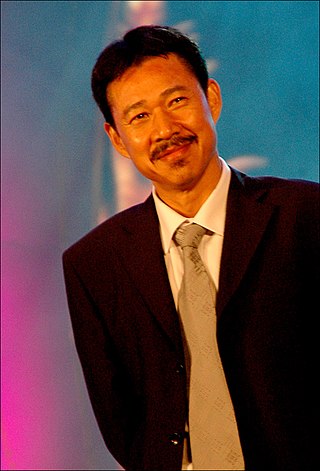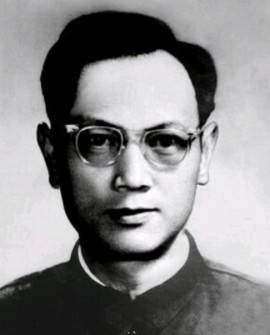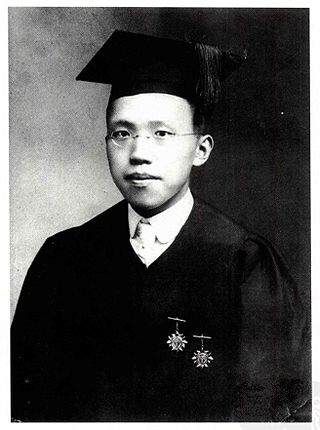
Zhang Wentian was a Chinese politician who was a high-ranking leader of the Chinese Communist Party (CCP).

Zhang Fengyi is a Chinese actor best known for his role as "Duan Xiaolou" in Farewell My Concubine (1993), Jing Ke in The Emperor and the Assassin (1998), and Cao Cao in Red Cliff (2008–2009).
Zhang Jie is a Chinese physicist. He served as President of Shanghai Jiao Tong University from November 2006 to February 2017. He was elected a member of the Chinese Academy of Sciences in 2003. He was elected to the German Academy of Sciences Leopoldina on March 28, 2007. He was elected as foreign associate of the US National Academy of Sciences in 2012.
Wang You, also known as Yu Wang, was a Chinese biochemist. He was a pioneer of antibiotics and biochemistry studies in China.

Peng Jiamu was a Chinese biochemist and explorer.

Zhang Zhaohuan was a Chinese physician and biostatistician.
Zeng Rong is a Chinese biochemist researching and developing technology for proteomics research. She is currently a professor at the Institute of Biochemistry and Cell Biology at the Shanghai Institutes for Biological Sciences.

The Mystic Nine is a prequel to the Chinese television series The Lost Tomb based on the internet novel Daomu Biji. It aired on Dragon TV and was broadcast online via iQiyi from 4 July to 17 October 2016.

Zhang Xiaoqian, also known as Hsiao-ch'ien Chang, was a Chinese gastroenterologist who is considered the founder of gastroenterology in China. He served as President of Hsiang-Ya Medical College and Vice President of Peking Union Medical College, and was a founding member of both Academia Sinica and the Chinese Academy of Sciences.
In 1965, Chinese scientists first synthesized crystalline bovine insulin, which was the first functional crystalline protein being fully synthesized in the world. Research on synthesizing bovine insulin started on 1958. Members in the research group were from the Chemistry Department of Beijing University, Shanghai Institute of Biochemistry, CAS and Shanghai Institute of Organic Chemistry, CAS.
Li Zaiping was a Chinese molecular biologist considered a pioneer in genetic science and engineering in China. His research team was the first in China to sequence a virus genome. He also utilized E. coli to produce human EGF and GM-CSF, and identified the gene LPTS. He was a professor at the Shanghai Institute of Biochemistry and Cell Biology and an academician of the Chinese Academy of Engineering.

Cao Tianqin, also known as Tien-chin Tsao, was a Chinese biochemist and a professor at the Shanghai Institute of Biochemistry. With a research focus on muscle protein, he discovered the myosin light chain and pioneered the study of tropomyosin and paramyosin using electron microscopes. He was a strong advocate and main leader for the synthesis of insulin, and spearheaded the research of plant viruses in China.

Wang Yinglai, also known as Ying-Lai Wang, was a Chinese biochemist recognized as the first person to create synthetic insulin, a major scientific breakthrough that produced a biologically active compound from inorganic chemicals. He was one of the first group of scientists elected to the Chinese Academy of Sciences in 1955. He founded the Shanghai Institute of Biochemistry in 1958 and served as its director until his retirement in 1984.
Xu Genjun was a Chinese biochemist. He was a professor at the Shanghai Institute of Biochemistry and Cell Biology. He was an academician of the Chinese Academy of Sciences and President of the Chinese Society of Biochemistry and Molecular Biology.

Zou Chenglu, better known as Chen-Lu Tsou, was a Chinese biochemist. He was a professor of the Shanghai Institute of Biochemistry and later a professor and Deputy Director of the Institute of Biophysics, Chinese Academy of Sciences (CAS). He made important contributions to the synthesis of insulin, and was elected an academician of the CAS and The World Academy of Sciences (TWAS). He won the TWAS Prize in Biology in 1992 for his pioneering study of enzyme inhibition kinetics, and was a six-time laureate of the State Natural Science Award. His wife, physicist Li Lin, was also an academician of the CAS.
Li Lin is a Chinese biochemist and academician of the Chinese Academy of Sciences. He served as director of the Shanghai Institutes for Biological Sciences beginning in 2013, and was director of the Shanghai Institute of Biochemistry and Cell Biology (SIBCB) from 2004 to 2009. He was also a member of the 12th National People's Congress. His research focus is the Wnt signaling pathway.
Zhang Yonglian, also known as Yong-Lian Zhang, is a Chinese molecular biologist and endocrinologist. She is Professor and Founding Director of the Shanghai Key Laboratory for Molecular Andrology at the Shanghai Institute of Biochemistry and Cell Biology, and a member of the Chinese Academy of Sciences.
Jue Chen is a Chinese-born American structural biologist and biochemist. She is the William E. Ford professor of biochemistry and head of the Laboratory of Membrane Biology and Biophysics at the Rockefeller University and a Howard Hughes Medical Institute investigator. Her research focuses on elucidating the structure and function of ATP-binding cassette (ABC) transporters.
Zhang Liangqi was a major general (shaojiang) of the People's Liberation Army (PLA) who served as president of the National University of Defense Technology from 1983 to 1990.









